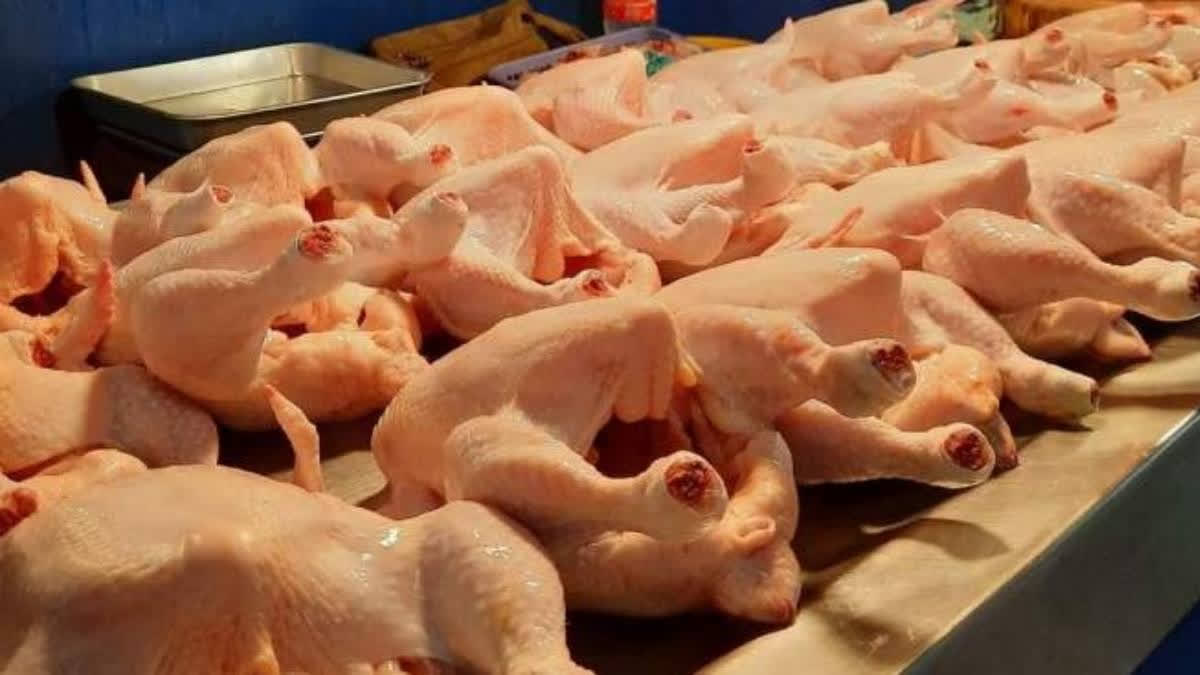Srinagar: Concern over the import of dressed chickens into markets across Jammu and Kashmir has escalated drawing attention to potential health risks for consumers. This follows a recent uproar over watermelon imports, raising questions about food safety standards and regulatory oversight in the region. Official data reveals that approximately 30 per cent of the market in Jammu and Kashmir is now dominated by dressed chicken with a staggering 90 per cent of restaurants opting to serve this type of poultry. The surge in consumption estimated at 1.50 crore dressed chickens annually in Kashmir alone has brought to light the lack of regulation in the import process, posing a pressing public health issue.
One of the primary concerns highlighted by experts is the absence of proper oversight and quality control measures in the current method of importing dressed chicken into Jammu and Kashmir. "Unlike branded products that come with essential labelling information such as the date and method of slaughter, best before date and storage temperature, dressed chicken arrives in the region without such requirements. This ambiguity raises questions about the freshness, safety and overall quality of the imported poultry," Dr Shabir Ahmad, a surgeon based in Srinagar, said.
He further said, "Restaurants also prefer imported dressed chicken because they find it easy to cook and serve, but this is not a good practice. And that is the reason sometimes you may notice a smell while taking a bite." Furthermore, experts warn that the unchecked influx of dressed chicken poses a significant threat to consumer health, as the absence of proper quality checks could result in the sale of contaminated or spoiled products. Dr Tariq Tramboo, an Interventional Pain Specialist, raised concerns about the origin of the imported chickens, questioning whether they were halal and whether proper transit temperatures were maintained, especially for chickens imported from countries like Vietnam, which are cheaper and preferred by hotels and restaurants.
"Chickens imported from countries like Vietnam are cheaper and thus preferred by hotels and restaurants. We don’t know if their transit temperature of -18 has been maintained and are they performed halal?" he pointed out. Responding to these concerns, Shagufta Jalal, Deputy Commissioner of the J&K Drug & Food Control Department, assured that steps were being taken to address the issue.
She stated that the department had instructed dealers of dressed chicken to procure refrigerated vans to ensure proper storage conditions during transit. Additionally, Jalal highlighted previous actions taken by the department, including the seizure and destruction of several quintals of dressed chicken found to be of poor quality or stored in unhygienic conditions.
She emphasised the proactive measures being undertaken by the department, with teams deployed and mobile testing vans stationed in key areas across Kashmir to conduct on-the-spot testing and ensure compliance with food safety standards. Addressing the recent controversy over watermelon imports, Jalal dismissed claims of premature ripening using chemicals, asserting that rigorous tests conducted by experts found no evidence to support such allegations. She criticised the spread of misinformation, particularly by individuals such as the unnamed oncologist, stressing the importance of consulting with authorities before making public statements that could cause undue distress among the population.
Read more: In A First, Namakkal Eggs Fly To Malaysia; Set To Help Asian Neighbour Tackle Shortage



